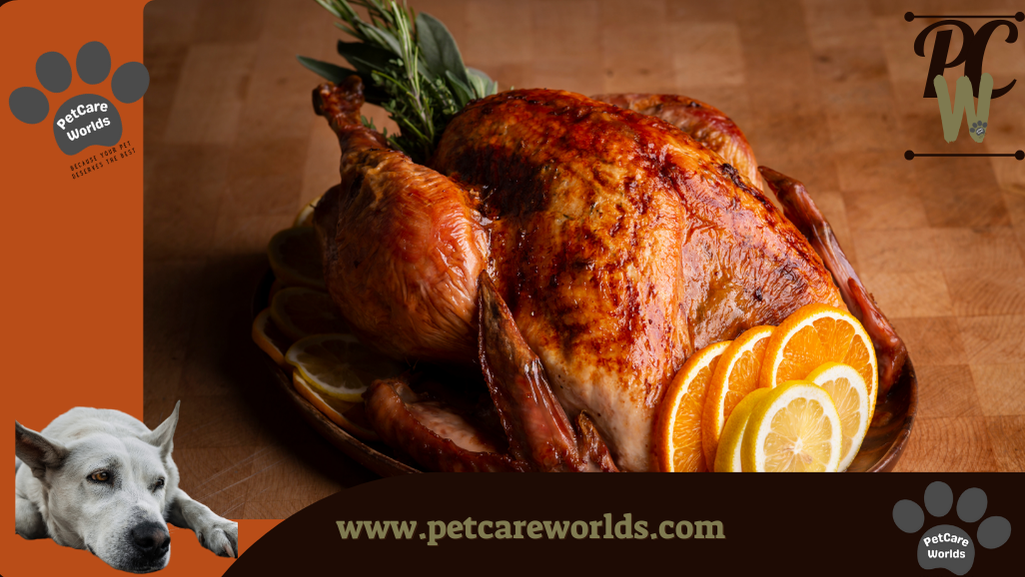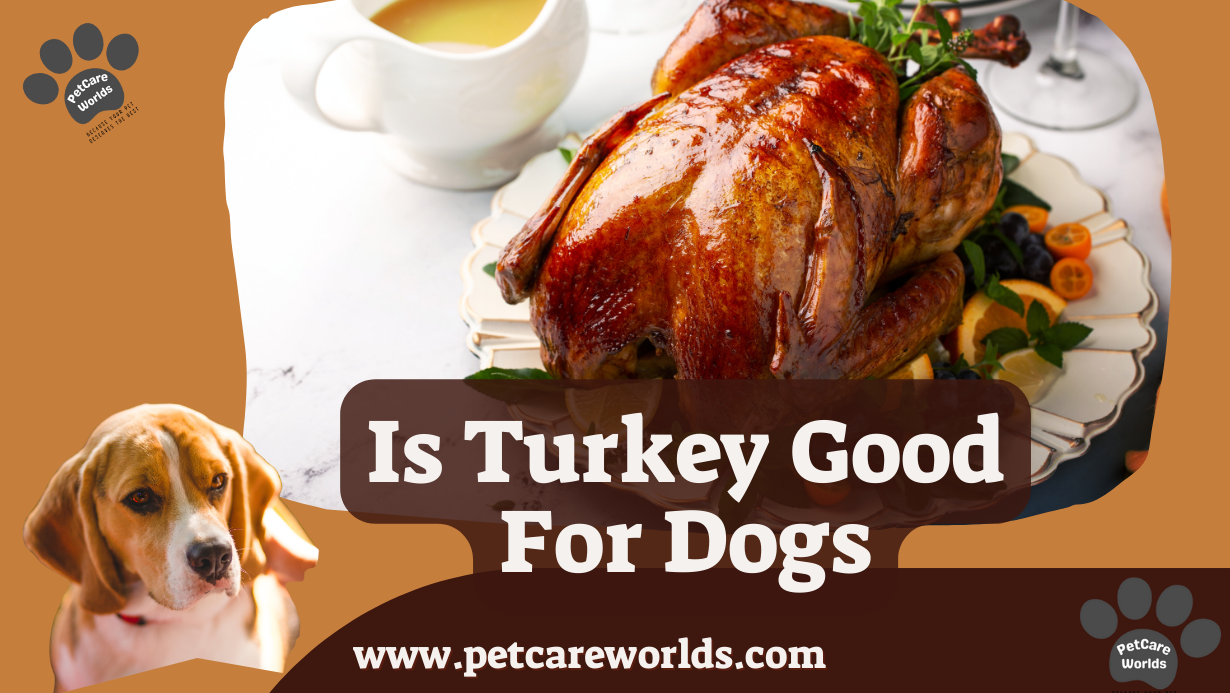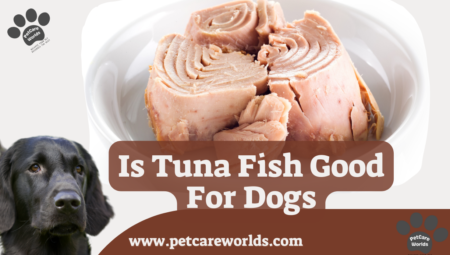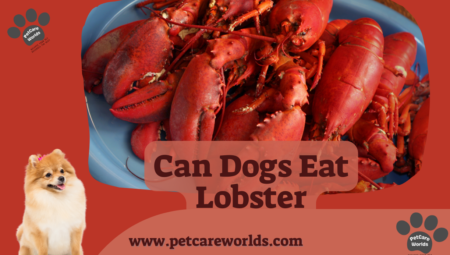Is turkey good for dogs? It’s a question that might pop into your mind as you prepare a holiday feast or enjoy a turkey sandwich. While turkey is often a safe and nutritious option for dogs, there are crucial factors to consider. Not all turkey is created equal when it comes to your furry friend. Could this lean protein be a healthy treat, or are there hidden dangers lurking in your leftovers? Let’s find out!
Is Turkey Good for Dogs?
Turkey can be a great protein source for dogs when prepared properly. It’s lean, packed with nutrients, and often found in many commercial dog foods. But not all turkey is safe. Here’s what you need to know:
- Always choose plain, cooked turkey without spices or seasonings.
- Remove all bones to avoid choking or internal injuries.
- Stick to white meat, as it’s lower in fat than dark meat or skin.
Turkey is a healthy option in moderation, but consult your vet before making it a regular part of your dog’s diet. Is turkey good for dogs
Why Discuss Turkey for Dogs?
Turkey often ends up in our meals, but is it safe for dogs? Many pet owners wonder if sharing this popular meat is healthy or harmful. It’s crucial to understand the dos and don’ts of feeding turkey to avoid risks like allergies, choking hazards, or digestive issues. Discussing this helps pet parents make informed choices for their furry friends. Is turkey good for dogs
Is Turkey a Common Ingredient in Dog Food?
Yes, turkey is a frequent choice in dog food recipes. It’s lean, rich in nutrients, and offers a great alternative to proteins like beef or chicken. Many grain-free and hypoallergenic dog foods feature turkey as the main protein. It’s even used in treats like freeze-dried turkey bites. Always check the label for added fillers or preservatives when buying commercial options. Is turkey good for dogs
Nutritional Benefits of Turkey for Dogs
Turkey provides essential nutrients that support a dog’s health, including:
- Protein: Builds strong muscles and supports growth.
- B Vitamins: Boosts energy and metabolism.
- Selenium: Strengthens the immune system.
- Phosphorus: Supports healthy bones and teeth.
This combination makes turkey a nutrient-packed choice for most dogs when given in moderation.
How Does Turkey Compare to Other Proteins?
Turkey stands out as a lean protein option compared to beef or pork, which are higher in fat. While chicken is similar in calories, turkey can be a better choice for dogs with poultry sensitivities to chicken. Additionally: Is turkey good for dogs
- Turkey is softer and easier to digest than red meats.
- It has fewer calories, making it ideal for weight management.
Choosing turkey ensures your dog gets quality protein without extra fat. Is turkey good for dogs
Turkey for Dogs with Allergies
For dogs with food allergies, turkey can be a game-changer. Many pups are allergic to common proteins like beef or chicken, and turkey offers a novel protein option. It’s also gentle on sensitive stomachs.
How to incorporate turkey for allergic dogs:
- Start small to ensure no adverse reactions.
- Pair it with vet-approved hypoallergenic foods.
- Avoid turkey-based foods with added allergens like wheat or soy.
Always consult your vet before making changes to your dog’s diet. Is turkey good for dogs

Can Dogs Eat Turkey Bones?
Turkey bones are not safe for dogs. Cooked bones become brittle and can splinter easily, causing choking or damaging the digestive tract. Raw bones are slightly safer but still carry risks like bacterial contamination. Always prioritize your dog’s safety and avoid giving them turkey bones. Is turkey good for dogs
Why Seasonings and Additives Are Dangerous
Seasonings like garlic, onion, or excessive salt are toxic to dogs. Additives in processed turkey, such as nitrates or preservatives, can cause digestive issues or long-term health problems. Stick to plain, unseasoned turkey to keep your pet safe. Is turkey good for dogs
Processed Turkey vs. Fresh Turkey
Processed turkey products, like deli meats or sausages, often contain high levels of sodium and additives, making them unsuitable for dogs. Fresh turkey, when cooked plain, is a healthier and safer option. Always avoid processed versions when feeding turkey to your dog. Is turkey good for dogs
Is Turkey Skin Safe?
Turkey skin is not recommended for dogs. It’s high in fat and often seasoned with ingredients harmful to pets. Consuming fatty skin can lead to pancreatitis or upset stomach. Remove the skin before serving turkey to your dog. Is turkey good for dogs
Preparing Turkey for Your Dog
When preparing turkey for your dog, simplicity is key. Cook it thoroughly, avoid seasoning, and remove bones and skin. This ensures the meal is both nutritious and safe. Is turkey good for dogs
Best Practices for Portion Size
- Keep portions small to avoid overfeeding.
- Consider your dog’s size and activity level when determining how much turkey to offer.
- Turkey should make up no more than 10% of your dog’s daily calorie intake.
The Role of Turkey in a Balanced Diet
Turkey can be an excellent protein source in your dog’s diet. Combine it with vegetables and grains for a well-rounded meal. Avoid relying solely on turkey to ensure your dog gets a variety of nutrients.
Avoiding Common Mistakes
- Don’t feed turkey bones or skin.
- Avoid seasoned or processed turkey.
- Introduce turkey slowly to prevent digestive upset.
Symptoms of Allergies or Intolerances
Some dogs may be allergic or intolerant to turkey. Watch for:
- Itching or skin irritation
- Vomiting or diarrhea
- Excessive licking or scratching
If these symptoms appear, stop feeding turkey and consult your vet.
What to Do If Your Dog Eats Unsafe Turkey?
If your dog accidentally eats seasoned or processed turkey:
- Check for symptoms of toxicity, like vomiting or lethargy.
- Contact your vet immediately if your dog shows signs of distress.
- Monitor your dog for any changes in behavior or appetite.
Are Thanksgiving Leftovers Safe for Dogs?
Most Thanksgiving leftovers are not safe for dogs. Stuffing, gravy, and seasoned turkey often contain harmful ingredients like garlic, onions, or butter. Stick to plain, cooked turkey and avoid sharing table scraps. Is turkey good for dogs
Consulting Your Veterinarian About Turkey
When introducing turkey to your dog’s diet, consult your vet for advice. They can provide guidance on portion sizes, preparation methods, and whether turkey is suitable for your dog’s specific needs.
Dog-Safe Turkey Treats You Can Make at Home
Creating homemade turkey treats is a great way to spoil your dog! Here are a few ideas:
- Turkey jerky: Thinly slice turkey and bake at a low temperature until dried.
- Turkey meatballs: Mix cooked turkey with oats and a small egg, shape into balls, and bake.
- Frozen turkey bites: Blend cooked turkey with plain yogurt, freeze in molds, and serve as a cool snack.
Keep it simple and avoid adding any harmful ingredients! Is turkey good for dogs

Is Turkey Good for Dogs?
Below is a quick guide to help you understand whether turkey is suitable for your dog:
| Aspect | Details |
|---|---|
| Protein Content | Turkey is a high-quality protein source, supporting muscle development and overall health. |
| Digestibility | Turkey is easy to digest and suitable for dogs with sensitive stomachs. |
| Allergen Potential | Some dogs may be allergic to turkey; monitor for skin issues or digestive upset. |
| Preparation | Only serve plain, cooked turkey without seasonings, skin, or bones. |
| Portion Control | Turkey should make up no more than 10% of your dog’s diet to ensure balance. |
| Processed Products | Avoid deli meats or turkey sausages, as they contain high sodium and harmful additives. |
“Turkey can be a nutritious addition to your dog’s diet, but preparation and portion control are key to ensuring it’s safe and healthy.”
Is Turkey Good for Dogs? FAQ
1. Can dogs eat turkey every day?
Yes, but only in moderation. Turkey should complement a balanced diet and not replace other essential nutrients your dog needs. Plain, cooked turkey is best for occasional meals or treats.
2. Are turkey bones safe for dogs?
No. Both raw and cooked turkey bones can splinter and cause choking, intestinal blockages, or internal injuries. Always remove bones before serving.
3. What about turkey skin?
Turkey skin is not safe for dogs due to its high fat content and potential seasonings, which can lead to digestive upset or pancreatitis.
4. Can puppies eat turkey?
Yes, puppies can eat turkey as long as it is plain, cooked, and free from skin, bones, and seasonings. Always adjust portion sizes based on their age and weight.
5. What are the signs of a turkey allergy in dogs?
Symptoms of a turkey allergy include itchy skin, digestive upset (vomiting or diarrhea), or ear infections. Consult your vet if you notice these signs.
6. Is deli turkey safe for dogs?
No. Processed turkey, such as deli meat, contains high levels of sodium and preservatives that can harm your dog. Stick to fresh, cooked turkey instead.
7. Can dogs eat Thanksgiving turkey?
Only if it’s plain and unseasoned. Thanksgiving turkey often contains garlic, onion, and other ingredients that are toxic to dogs.
8. How much turkey is too much?
Treat turkey as a small part of your dog’s diet. It should not exceed 10% of their daily caloric intake to prevent imbalances.
9. Can dogs eat turkey giblets?
Yes, if they’re cooked and served plain. Giblets (liver, heart, etc.) are nutritious but rich, so offer them sparingly.
10. Should I consult my vet before adding turkey to my dog’s diet?
Yes, especially if your dog has existing health issues, allergies, or dietary restrictions. A vet can help you determine if turkey is a good fit.
Conclusion
Is turkey good for dogs? Yes, when served plain and in moderation. Avoid bones, skin, and seasonings to ensure a safe and nutritious treat for your pet.





